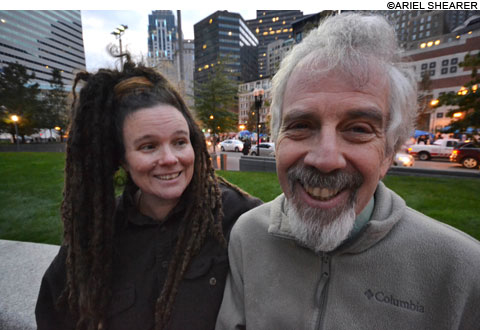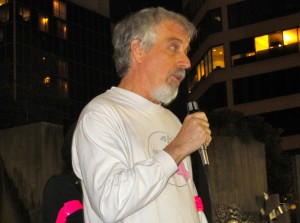Unions Tell City Hands Off Occupy Baltimore
Cheers to the unions for stepping up in strong support of Occupy Baltimore in the face of the city’s plans to clear our encampment! Note that the Fraternal Order of Police are among the signatories:
“Dear Mayor Rawlings-Blake:
We have been made aware of the city of Baltimore’s intention to close down the Occupy Baltimore site sometime in the next 24 hours. We write to express our firm opinion that nothing be done to close down the site and that instead, an agreement be arrived at which allows for the confrontation of a peaceful, non-violent demonstration.
The Occupy Baltimore protests have given expression to a widely shared belief that our economy and our politics are controlled by corporate interests to the detriment of the overwhelming majority of working people, including our members, their families and communities. We share this opinion and applaud the courage and sacrifice of the Occupy protesters. We believe these protesters should be commended for standing up for the 99% of us, not threatened with removal.
Cities across the country – from San Diego to Little Rock, Philadelphia and Washington DC – have worked with their local Occupy movements to find reasonable accommodations that everyone can live with. Surely, the city of Baltimore can find a solution that meets the concerns of city officials and departments while allowing the protestors to continue their democratic right to peaceful, non-violent protest.
The Occupy Baltimore activists have made a broad call for followers to converge on McKeldin Square in order to defend the occupation tonight. Rather than create a confrontation, we believe it would be wise for the city of Baltimore to act with restraint and responsibility. Rather than remove the protesters, we call upon the city to work with representatives of Occupy Baltimore to find a solution that can maintain the protest location and respect the rights of our citizens.
We look forward to your quick response.
Sincerely,
Ernie Grecco, President, Metro Baltimore Council AFL-CIO
Glen Middleton, Executive Director, AFSCME 67
Anthony Coates, AFSCME Local 647-67
Peggy Peacock, AFSCME Local 2202-67
Ms. Johnnie Phipps, AFSCME Local 558-67
Lorretta Johnson, Secretary-Treasurer, AFT
Mariette English, President, Baltimore Teachers Local 340
Brenda Clayburn, President, City Union of Balto Local 800
Steve Fugate, President, Fire Officers Local 964
Rick Hoffman, President, Fire Fighters Local 734
Jimmy Gittings, President, Public School Administrations and Supervisors Association Local 25
Rod Easter, President, Balto Building Trades Council
Bob Cherry, President, Fraternal Order of Police Lodge #3
Subscribe to this blog's RSS feed
How Did Hippie Chick Diaries Become Occupy Diaries? (Part One)
I’m on quite a magic carpet ride, I have to say. Three weeks ago, my partner C.T. Butler and I were quietly working from home. We were assembling a book proposal for C.T.’s memoir of the early years of Food Not Bombs. We had hopes that such a book could help us promote the historic work of the international Food Not Bombs movement, and consensus decisionmaking, one of FNB’s cornerstone principles.
In this work, I’d put my own writing for Hippie Chick Diaries on hold to listen to C.T. spin tales of that first FNB house, a collective of young activists from the anti-nuclear movement. Stories full of color, the three-legged dog and the punk rock scene. Late night stencil graffiti and early morning van runs to pick up cases and cases of food. The sign on the wall of the collective: No Rulers, Not No Rules.
And Meetings. C.T. claimed to have been to many thousands of meetings. I couldn’t imagine this until, doing research, I thumbed through his datebooks, which go back to the early eighties. And then I saw for myself—Some days only had one or two meetings. But C.T. was some kind of boy scout activist, attending often four or more meetings in a single day. Meetings for environmental groups, neighborhood associations, anti-war, anti-nuclear, feminist, animal rights, GLBT, war tax resistance, Food Not Bombs and the non-profit version, Food For Free…
When C.T. set out to write On Conflict and Consensus, he had a unique foundational understanding of how groups go wrong in their process and what to do about it. He had indeed attended many thousands of meetings.
“I would kill myself,” our friend and community mate Matt remarked when I told him this. I think it’s a rare person who is so interested in and attuned to process that she or he can attend even one or two meetings, several days running, without going a little wiggy.
 But C.T.’s stories and his consensus model had become my world as he and I scheduled workshops, fielded phone calls for consensus help and shaped up the book proposal.
But C.T.’s stories and his consensus model had become my world as he and I scheduled workshops, fielded phone calls for consensus help and shaped up the book proposal.
Then came Occupy Wall Street and with the coverage came C.T.’s running political analysis. He became like those guys yelling coaching strategies at their tv’s. He would make comparisons to Food Not Bombs and other actions. But whenever I suggested we should be there, instead of our hut in the woods, he would change the subject.
For the past decade or so, C.T. had focused on teaching and writing about consensus. He stayed in the activist game from afar, taking phone calls from Food Not Bombs chapters needing advice, doing the occasional radio show. But after being arrested more than fifty times in non-violent direct actions, C.T. had had his fill of the brutality of some police. Indeed, he now as PTSD.
“Some police are just blue collar folks,” C.T. would say, “And they wouldn’t enjoy having to arrest us for giving out free food. But some are actually sadists, and those are the ones they sent for us,” referring to beatings he received in San Francisco, New York and other places.
Another community mate, Paul, noted the growing Occupy movement and said to C.T., “Sounds like your kind of thing. Are you going to join in soon?”
The next day, C.T. was in a dark place. None of our plans would work. None of our efforts would ever make a difference. To make matters worse, it was his birthday. The best I could do was to just hold space and softly facilitate the facilitator as he moved through his dark places. Every now and then I would push, “We’re going to Occupy Baltimore tomorrow!”
I was driven by instinct and my own desire to show up. And I believed that it was important for him to be there. After a couple of days of telling me it was the last thing he needed, he agreed to check out our local Occupy with me.
Stay tuned for Part Two
Updated Press Release
*****FOR IMMEDIATE RELEASE*****
UPDATE: CITY DEFERS OCCUPY BALTIMORE PERMIT REQUEST, SUGGESTS
COMPROMISE; OCCUPATION CALLS FOR PUBLIC SUPPORT
Occupy Baltimore has been peacefully gathering in McKeldin Square on
the corner of Pratt & Light Streets since October 4th, 2011. Today
marks the start of the fourth week of the encampment. Early last week,
after pressure from the Baltimore City police department and the
department of parks and recreation, Occupy Baltimore filed an
application for a permit to continue the encampment indefinitely.
On Monday, Occupy Baltimore received word that the Department of Parks
& Recreation Department has not approved their permit application, and
instead suggested a compromise that would allow Occupy Baltimore to
continue to occupy McKeldin Square indefinitely without a permit
during the daytime hours, but limit overnight presence to a maximum of
2 people, and restrict the encampment as a whole to a smaller corner
of the Square. The city has asked for an answer to the proposed deal
by Wednesday Oct 26th and stated that if Occupy Baltimore agrees, they
will not be removed from the park for failing to obtain a permit.
Should Occupy Baltimore refuse to comply with the requests to limit
the overnight presence, then the city “has the right to terminate
these special accommodations,” though no specific date for termination
has been announced. In preparation for any possible intervention by
the city, Occupy Baltimore participants are issuing a general call for
all allies to join the encampment starting tonight to support and
protect the group sustaining the occupation at McKeldin Square.
Over the course of the past three weeks, Occupy Baltimore has begun a
directly democratic dialogue, and considering their peaceful and
respectful assembly, the group requests that the city allow them to
maintain this peaceful democratic space, as city government
counterparts have in Philadelphia and Washington DC. Representatives
of Occupy Baltimore, assisted by the Maryland chapter of the ACLU, are
currently in discussion with the Department of Parks and Recreation
about possible negotiations on the proposed deadline and the overnight
stay limitations. These limitations present a clear concern for the
Occupation, which has a complex and pre-existing infrastructure,
including dedicated teams for media, food, direct action, outreach,
security, and other working groups that require consultation and
consideration, as well as physical space onsite.
Occupy Baltimore is committed to maintaining a vibrant, safe space in
McKeldin Square as the movement continues to grow an organic
infrastructure of democratic representation, arts, culture, and
Political debate while still allowing the public to pass through
McKeldin Square, and inviting them to join in the occupation and
associated activities.
Occupy Baltimore recognizes that their requests are outside of the box
for the city’s existing permit system, but encourages the city to work
alongside peaceful and respectful demonstrators to create a legal
space where all voices can be heard.
The Occupation remains hopeful that the City of Baltimore will
continue to work with the movement in the coming days and weeks to
ensure the continued existence of this peaceful gathering.
Participants state, however, that they are closely monitoring police
presence in the area as the city’s deadline approaches. They encourage
supporters to maximize presence in the Square starting today, and
continuing throughout the week, should the authorities decide to clear
the area on or after the Wednesday, October 26 deadline.
******
For more information, or to schedule a time to visit the occupation
movement in Baltimore, please email occupybaltimoreme…@gmail.com or
visit www.occupybmore.org
Urgent Call to Solidarity: Join Occupy Baltimore This Wednesday, October 26, 2011
From Wren:
Occupy Baltimore has received an ironically named “permission document” from the city. It seeks to end our occupy presence by essentially prohibiting tents and overnight camping, and by squeezing all our functions into a little seen corner of the park.
To show our true numbers, Occupy Baltimore urgently calls on all of our supporters to join us on Wednesday, October 26, 2011 in McKeldin Square at Pratt and Light Streets! Wednesday is the deadline the city gives us for complying with requirements that would essentially end our movement! Join us to send a message that clearing McKeldin will not make us go away!
Rather than recognizing that the protesters of Occupy Baltimore are “we, the people,” and joining us in support of our action to create a Baltimore where all voices are heard, the city has opted to remove us from view.
To quote the city’s document, “No overnight tents and no overnight camping will be allowed except for one tent with up to two individuals…who may remain overnight to watch over the site and any property…All others must leave McKeldin square area by midnight, the time that the area is closed to visitors”
In reference to a reduced area, it states, “Occupy Baltimore has been given a map detailing the footprint perimeter of their occupied area, the area where any tents or signs or any set ups may be placed.”
Reporting back from a small discussion group at Tuesday night’s General Assembly, Occupy member Michael Hanes quipped, “We consensed that they have given us a map…”
The city’s document offers Occupy Baltimore ” 10 (ten) pop-up tent shelter facilities (at no cost)” presumably to replace the very colorful array of tents that are now visible from downtown streets. I heard one small group discussion member retort, “I’m all for the city giving us stuff for free, but I’m not for taking down tents!”
My partner, Food Not Bombs co-founder and consensus trainer C.T. Butler did a call and response with the Monday night General Assembly, “Do we have a permit to be here?” (“No.”) “Are we here?” (“Yes!”) “Do we need a permit to be here?” (“No!”)
So Join us all day Wednesday, October 26, 2011 in McKeldin Square. Stay as long as you can; We have food! BRING MORE TO SHARE! Stay overnight if you can. But JOIN US JOIN US JOIN US!
Baltimore does not have to push back against Occupy. In Albany, New York, city and state police defied their mayor and governor and refused to arrest 700 Occupy protesters.
In my hometown, Louisville, Kentucky, the city has given that Occupy encampment a permit through the end of the year.
JOIN US IN SHOWING THAT OCCUPY IS GROWING. JOIN US TO SAY WE WON’T GO AWAY!
Why does Wednesday matter? Last night after the General Assembly, a woman came through the square with her family—children, and grandchildren in strollers. She was not obstructed in her ability to move through the space in any way. “I love you all!!!” she shouted. She immediately got love back and an invitation to join us. She turned to me and said, “I can’t. I work three jobs. I just got turned down for disability again. I’m hanging in but I just can’t get down here!”
I was reminded then that these early stages of Occupy are about the people with privilege who can come down, representing and making the safe space for all.
C.T. and I have been managing to attend about every other day. We don’t stay overnight, but we plug in and we represent.
Who can you represent on Wednesday?
Below is, I believe, Occupy Baltimore’s official press release that went out this morning:
For Immediate Release
CITY SETS DEADLINE FOR OCCUPY BALTIMORE DISPERSAL
Occupy Baltimore has been peacefully gathering in McKeldin Square on
the corner of Pratt & Light Streets since October 4th, 2011.
The City of Baltimore Parks & Recreation Dept has refused their
request for a permit to legally occupy this space, and has responded
to their permit request with a set of unreasonable demands – including
a limit of 2 people overnight, and limiting the group to a small area
in the corner of the park. Furthermore, they have given the group an
eviction deadline of Wednesday Oct 26th to be in compliance with these
demands, which would essentially end their movement.
In the past three weeks, Occupy Baltimore has begun a directly
democratic dialogue, and considering their peaceful and respectful
assembly, the group requests that the city allow them to maintain this
peaceful democratic space, as city government counterparts in
Philadelphia and Washington DC have.
The city suggests that the demonstrators agree in good faith to
maintain only one overnight tent with just two people. Occupy
Baltimore counters that anyone who wants to stay in their space is
allowed a safe place to stay, out of the elements and with enough food
to eat. Furthermore, Occupy Baltimore has a complex infrastructure
already, with media, food, direct action, outreach, security, and
other working groups, which couldn’t possibly be contained within two
people.
The city also suggests that the demonstrators agree in good faith to
limit their presence to within a small amount of space within McKeldin
Square, reducing the demonstration to a fraction of its original size,
and placing it in an obscure corner of the park. Demonstrators counter
that they would like to create a vibrant safe space that takes up as
much of the square as possible so that they can continue to grow an
organic infrastructure of democratic representation, arts, culture,
and safe space while still allowing passerby to pass through McKeldin
Square.
Occupy Baltimore recognizes that their requests are out of the box for
the city’s existing permit system, but encourages the city to work
alongside peaceful and respectful demonstrators to create a legal
space where citizens’ voices can be heard. Organizers add that
accepting the city’s demands would essentially end their occupation
movement.
The city has given demonstrators an ultimatum to accede to their
request by Wednesday the 26th.
******
For more information, or to schedule a time to visit the occupation
movement in Baltimore, please email occupybaltimoreme…@gmail.com or
visit www.occupybmore.org“
A Polyamory Pioneer
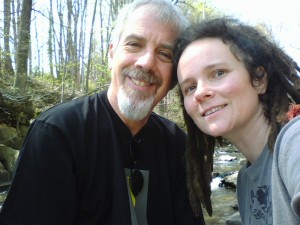 Part of the Occupy meme is its holistic nature. C.T. has been living this by being on the cutting edge of many cultural changes, including redefining family and love in the modern era. Identifying as polyamorous before the word existed, C.T. did a thoughtful, informative podcast interview with writer/journalist Eric Francis about polyamory.
Part of the Occupy meme is its holistic nature. C.T. has been living this by being on the cutting edge of many cultural changes, including redefining family and love in the modern era. Identifying as polyamorous before the word existed, C.T. did a thoughtful, informative podcast interview with writer/journalist Eric Francis about polyamory.
In the interview, you’ll hear C.T. talk about the challenges of long term partnerships with lovers who were not poly when he met them, and contrasting that dynamic with his current live-in relationship with a woman who identified and lived as poly before they met—That’s me, of course!
 In a previous blog article on C.T., Francis called him “the man I consider one of the most valuable, innovative lobes in the brain trust of doing things not just differently but better.” Here’s the podcast:
In a previous blog article on C.T., Francis called him “the man I consider one of the most valuable, innovative lobes in the brain trust of doing things not just differently but better.” Here’s the podcast:
http://planetwaves.net/pagetwo/planet-waves-fm/planet-waves-fm-a-conversation-with-c-t-butler-about-relationships-the-universe-and-everything/
C.T. and Wren at Occupy Boston: A Food Not Bombs Homecoming!
The Boston Phoenix feature on C.T. Butler is live here:
http://thephoenix.com/Boston/news/128671-ct-butler-is-back-on-the-fro…
and hitting newsstands Thursday. I’ve copied it below and added some pics. I’m just thrilled at how the writer captured C.T.’s exuberance toward the movement. It’s a beautiful thing! Please share the above link with friends in other occupys so they can know that C.T. is available to help when they have trouble with process. We don’t want people peeling off because they don’t understand process or don’t feel heard!
Count Voices, Not Votes!
P.S. Of course, it’s a little embarrassing when the writer quotes C.T. in one article as saying, “I’m an anarchist – I don’t want power over any of you.” And then he labels C.T. “the king of consensus” in the feature. Gotta take it with a grain of spin…—WT
Chris Faraone’s article:
C.T. Lawrence Butler hasn’t been to Boston in nearly a decade. Yet it takes the godfather activist fewer than five seconds to get his bearings when he steps off the train from Baltimore.
Emerging from South Station, Butler strides toward Occupy Boston’s tent city, wheeling a suitcase filled with books, handouts, and other weapons against mass oppression. A progressive icon who co-founded Food Not Bombs (FNB) in the 1980s, Butler has entangled his five-foot-seven frame in enough police beatings to cause post-traumatic stress disorder. He knows his way around a protest.
Butler came to lend the occupiers support. But now he stops in his tracks. He recognizes the landscape and suddenly realizes he fought on the same battlefield three decades ago.
“This is where it all began,” he says, pointing to the Federal Reserve Bank of Boston. “Right over there, on the lawn outside of that big oppressive building, was where we had our first Food Not Bombs feed in March of 1981.”
But the association goes far deeper than that coincidence of history. In many ways, the Occupy movement is the flowering of seeds that Butler planted decades ago. He wrote the book on consensus-making — literally. Ideas from his flagship work, On Conflict and Consensus, are staples of the democratic decision-making process as it’s practiced in Occupy camps from the Bay Area to Baltimore. Similarly, the 1992 Food Not Bombs handbook, which Butler co-authored with fellow FNB co-founder Keith McHenry, provides a sort of blueprint for large-scale actions like Occupy, in which facilitators are challenged to synthesize wildly diverse groups of varying interests.
As he walks into the camp, no one recognizes him. He’s just another protestor. But he can’t help but marvel at the manifestation of his life’s work.
“I’d like to think that I have something to do with this,” he says.
CHARMED LIFE
Butler enjoyed a charmed artistic life until the 1980s. The Delaware-cum-Long Island native lived on Beacon Hill, and helped manage the Charles Playhouse in the nearby theater district. He also produced plays, mostly of the pop-intellectual type, which he put on at Boston Center for the Arts, among other venues. But that all changed on May 24, 1980, when, at the age of 17, he joined thousands of other young people in storming the construction site of the future Seabrook nuclear station.
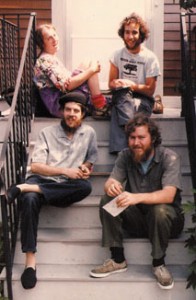 Three years earlier, in 1977, more than 1400 anti-nuke activists, aligned with the legendary Clamshell Alliance, were arrested for setting up a tent city at Seabrook. The 1980 action that Butler participated in was a last-ditch effort to rekindle the Clamshell legacy by occupying the facility. But New Hampshire state police, along with the National Guard, had a different plan: as soon as protesters sliced through fences and entered the property, troops pounced on the crowd, spraying tear gas and beating people senseless. Butler avoided physical injury, but says the assaults nonetheless left lasting marks.
Three years earlier, in 1977, more than 1400 anti-nuke activists, aligned with the legendary Clamshell Alliance, were arrested for setting up a tent city at Seabrook. The 1980 action that Butler participated in was a last-ditch effort to rekindle the Clamshell legacy by occupying the facility. But New Hampshire state police, along with the National Guard, had a different plan: as soon as protesters sliced through fences and entered the property, troops pounced on the crowd, spraying tear gas and beating people senseless. Butler avoided physical injury, but says the assaults nonetheless left lasting marks.
“I didn’t even go to Seabrook for the politics,” says Butler. His father was a white-collar administrator for the military defense contractor Thiokol, and Butler recalls his family as being non-political. “I went down there for the drama, and out of curiosity, and to be a part of it all. I had no idea that my life would never be the same after that — that’s when I became an activist.”
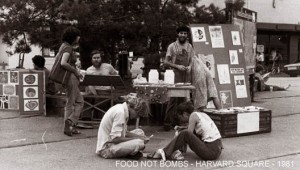 In a story that you might hear old radicals recite over lagers at the Plough and Stars, Butler — along with six other FNB founders, including McHenry — spun the energy they harnessed at Seabrook into a food collection and distribution charity. They orchestrated a successful defense for Brian Feigenbaum — their friend, legal advisor, and future FNB collaborator who was arrested at Seabrook for allegedly hurling a grappling hook at a police officer. After that win, the team began preparing regular meals for the homeless, and feeding protesters at demonstrations from New Hampshire to New York City. They also grew close personally, living together in a life cooperative at 195 Harvard Street, near Central Square.
In a story that you might hear old radicals recite over lagers at the Plough and Stars, Butler — along with six other FNB founders, including McHenry — spun the energy they harnessed at Seabrook into a food collection and distribution charity. They orchestrated a successful defense for Brian Feigenbaum — their friend, legal advisor, and future FNB collaborator who was arrested at Seabrook for allegedly hurling a grappling hook at a police officer. After that win, the team began preparing regular meals for the homeless, and feeding protesters at demonstrations from New Hampshire to New York City. They also grew close personally, living together in a life cooperative at 195 Harvard Street, near Central Square.
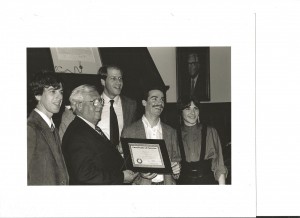 Butler, also a member of the City of Cambridge Peace Commission at the time, worked with FNB until 1983. That year, he went on to co-found Food for Free, an FNB offshoot that still provides needy people around Greater Boston with more than one million pounds of meals a year. After leaving the Boston area in 1987, Butler continued protesting power and corruption, and often squatted in San Francisco, where he and a relocated McHenry revitalized FNB to grow it westward. After violent arrests in response to their peaceful actions spurred a wave of sympathetic news coverage, the pair succeeded in expanding Food Not Bombs to more than 30 American cities.
Butler, also a member of the City of Cambridge Peace Commission at the time, worked with FNB until 1983. That year, he went on to co-found Food for Free, an FNB offshoot that still provides needy people around Greater Boston with more than one million pounds of meals a year. After leaving the Boston area in 1987, Butler continued protesting power and corruption, and often squatted in San Francisco, where he and a relocated McHenry revitalized FNB to grow it westward. After violent arrests in response to their peaceful actions spurred a wave of sympathetic news coverage, the pair succeeded in expanding Food Not Bombs to more than 30 American cities.
In the time since, Butler has stayed off the front lines and mostly focused on teaching consensus-making. For the past three years, he’s lived with his partner, the magnificently dreadlocked Wren Tuatha, in a Maryland community called Heathcote, where the couple teaches peaceful communication. Butler never expected to step back into the protest arena; his post-traumatic stress disorder — the result, he says, of being placed in Vulcan-grip compliance holds and knocked unconscious several times — has kept him away from big crowds and mass actions for years. That all changed when he heard about Occupy.
PICKET-LINE REUNION
I first met Butler at Occupy Baltimore, where I’d stopped on my tour of five Occupy camps in search of the big picture. He was an outsider, having just shown up in McKeldin Square for the first time that afternoon. But by the time that I returned for the nightly general assembly, Butler had been invited to address the entire group. Having been told that earlier Baltimore meetings were compromised by out-of-turn dissent and soapbox soliloquies, he used the platform to teach how young activists how to find consensus in affinity groups before uniting for assemblies. “If an idea doesn’t work in a group of 10 people,” he told the attentive crowd, “it definitely won’t work in a group of 200.”
Now Butler hopes to bring that message to Boston, and to any other Occupy cities that will hear him out. This past weekend, he and Tuatha introduced themselves to everyone around Dewey Square who would listen. Butler was given a table inside camp to distribute tracts on consensus techniques, and spent most of Saturday schooling young people and greeting old friends who’d come out for an anti-war rally that afternoon. Back in the area for the first time in years, he now hopes to get the band back together. Anne Shumway, an old-time picket-line co-defendant, becomes animated at the sight of Butler: “We got arrested together for years,” she tells everyone in earshot. “And look at us now — we’re still doing this.”
After that reunion and others, Butler crosses to the other side of Atlantic Avenue. There, on the bench area outside the Federal Reserve Bank, Occupy Boston has scheduled him to lead a workshop in consensus decision-making. A dozen people show up. He’d hoped for a bigger turnout, but didn’t expect to suddenly become the focal point of a movement that’s grown into the thousands. Still, he shares stories of effective practices, and asks the small group to spread the word that he’ll be back in two weeks.
Toward the end of his talk, a fleet of motorcycle cops that was idling in front of the reserve building takes off to follow college students on a march. Butler eyes the entrance to the Federal Reserve, the place where it all began.
“Now’s our chance,” he jokes. “I’ve been waiting 30 years for this — let’s storm this place.”
Chris Faraone can be reached at cfaraone@phx.com. Follow him on Twitter @fara1.
Associated Press Quotes C.T. Butler on Occupy Movement and Diversity
Here’s a link to an article,
Occupy protesters eye diversity as movement grows
On Saturday, C.T. Lawrence Butler was interviewed by an Associated Press reporter collecting background on the Occupy Movement. C.T., co-founder of the worldwide movement Food Not Bombs, has been writing about and teaching values-based consensus decisionmaking for thirty years. For a little over a week, he’s been volunteering his guidance and participating in Occupy Baltimore.
When he spoke to the AP he and I were on an Amtrak traveling to Boston, both to visit Occupy Boston and to see him be honored for co-founding the Cambridge non-profit Food for Free. C.T. is author of On Conflict and Consensus and Consensus for Cities, as well as Food Not Bombs: How to Feed the Homeless and Build Community.
Here’s a quick clip of his quote, for the furiously busy:
In Baltimore, there are people representing different racial, ethnic, age and income groups, but not in proportion to the city’s population. Occupy Baltimore group organizer C.T. Lawrence Butler, who is white said there has been talk of going out to communities around the city to try to attract more people, but the group is just building steam and hasn’t had a chance to put together official outreach. Instead, individuals have been reaching out to communities on their own, a strategy that may work better.
“Everybody would like more diversity,” Butler said. “The group is focusing on creating a place where everybody can feel safe speaking up.”
Of course, their conversation was about an hour long, and much more nuanced, and we cringe at the use of the title organizer, but we are happy with this as an essence.
This contact was part of a larger wave of press contacts, including the LA Times and The Boston Phoenix. In fact, C.T. and I had the Phoenix reporter embedded with us for much of the Boston trip, and a feature article will appear online this Wednesday, in print on Thursday.
From these information requests, interviews and changes in the google rankings for the word consensus, it’s clear that the press and the mainstream world are starting to ask, “What is this thing called consensus that these protesters are doing?”
C.T. will surely be fielding more of these calls in the coming weeks. His website, consensus.net, will have updated press contact information soon. For now, contact me, Wren Tuatha, at 410-458-2310 or curiocoast@comcast.net.

